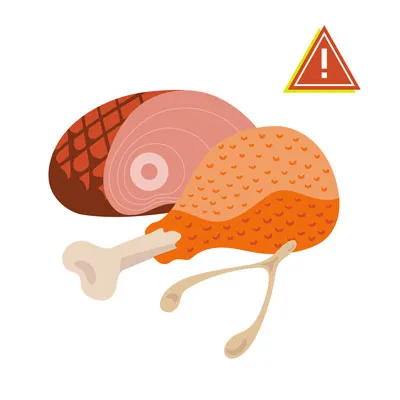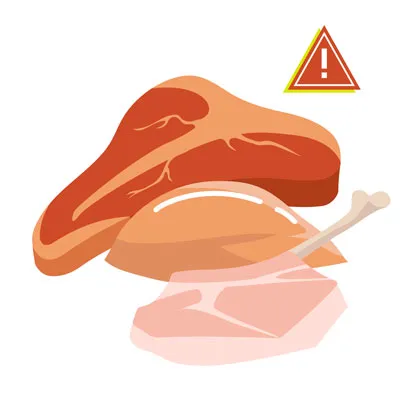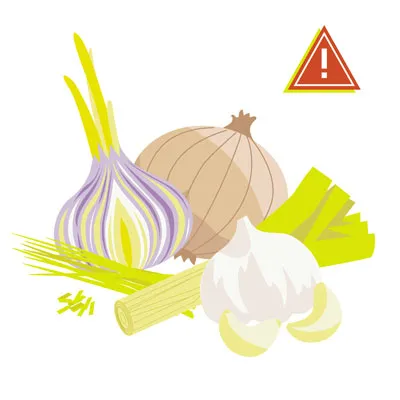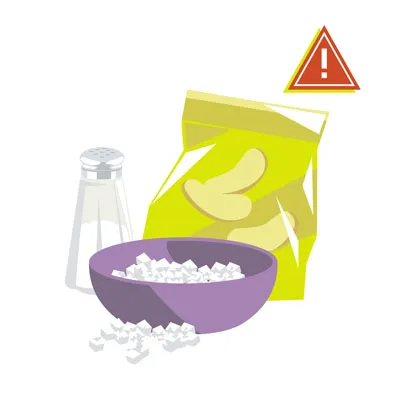As loving dog owners, we often want to share our meals with our furry companions. However, what tastes delicious and is safe for humans can often be toxic or harmful to dogs. Understanding What Meat Should Never Be Given To Dogs is crucial for their health and well-being. From fatty cuts to raw preparations and even the bones, many common meat-related items pose significant risks that can lead to severe illness or even be fatal. This guide will help you navigate the complexities of your dog’s diet, ensuring you keep them safe from potentially dangerous meat products and their common accompaniments. For a more positive outlook on safe feeding, you can explore what foods are good for dogs to eat that are beneficial for your canine companion.
Why Certain Meats and Related Items are Dangerous for Your Dog
Canine digestion and metabolism differ significantly from our own, meaning dogs process certain substances very differently. What humans can easily digest, dogs might find problematic or even deadly. For instance, substances that might pass through the human system harmlessly can build up quickly in a dog’s body, reaching toxic levels.
Beyond direct toxicity, other risks include physical hazards, such as choking or internal damage from bones, and bacterial contamination from undercooked foods. Food toxicity can also vary based on a dog’s size, breed, and existing health conditions, making it essential to be well-informed and consult your veterinarian with any concerns about your dog’s diet.
Meats and Meat-Related Products to Absolutely Avoid
Many common household meat products, or items frequently associated with meat preparation, are dangerous for dogs. Being aware of these can prevent accidental poisonings and health emergencies.
1. Fatty Meats and Skins
Fatty meats and skins are high in fat, which can be severely detrimental to a dog’s health.
- Chicken and Turkey Skin: These delicious crispy skins are loaded with fat. Feeding them to your dog can lead to acute pancreatitis, a life-threatening illness with serious complications.
- Ham and Other Fatty Cuts of Meat: Ham, bacon, and other fatty cuts of meat are often rich in fat and salt. Like poultry skin, their high-fat content can trigger pancreatitis in dogs. It’s always safer to avoid giving these to your pet as a treat and instead discard them.
Pancreatitis is an inflammation of the pancreas, which can be extremely painful and often requires intensive veterinary care. Symptoms can include vomiting, diarrhea, abdominal pain, and lethargy.
 Chicken & Turkey Skin, Ham, & Other Fatty Cuts of Meat*Fatty cuts of meat, like ham and poultry skin, are dangerous for dogs due to their high-fat content, which can lead to life-threatening pancreatitis.*
Chicken & Turkey Skin, Ham, & Other Fatty Cuts of Meat*Fatty cuts of meat, like ham and poultry skin, are dangerous for dogs due to their high-fat content, which can lead to life-threatening pancreatitis.*
2. Raw or Undercooked Meat
While some proponents advocate for raw diets, never feed your dog raw or undercooked meat without consulting a veterinarian and understanding the risks. The primary concern is bacterial contamination.
- Salmonella and E. coli: Raw meat can harbor dangerous bacteria like Salmonella and E. coli, which can cause severe gastrointestinal issues in dogs, similar to humans. These bacteria can lead to vomiting, diarrhea, and other serious infections.
- Parasites: Raw meat may also contain parasites that can be transmitted to your dog, causing various health problems.
It’s important to ensure any meat given to your dog is thoroughly cooked to eliminate these pathogens.
 Raw Meat*Raw meat can contain harmful bacteria like Salmonella and E. coli, making it unsafe for dogs to consume and potentially leading to serious illness.*
Raw Meat*Raw meat can contain harmful bacteria like Salmonella and E. coli, making it unsafe for dogs to consume and potentially leading to serious illness.*
3. Cooked Bones
Bones from cooked meat are incredibly dangerous for dogs and should always be avoided.
- Splintering: Cooked bones become brittle and can splinter easily, creating sharp fragments. These fragments can cause internal damage, such as puncturing the stomach or intestines, leading to fatal abdominal infections.
- Obstruction: Bones can also cause obstructions in the bowels or get caught in a dog’s throat, leading to choking or severe blockages that may require emergency surgery.
While some raw bones might be considered safe by some, the risks associated with any bones, especially cooked ones, are substantial. It’s always best to err on the side of caution and avoid feeding bones altogether. If you are looking for safe alternatives, many what human food can dogs eat as treats options exist.
4. Processed Meats and Additives
Beyond just fat content, many processed meat products contain other harmful ingredients.
- High Sodium: Processed meats like hot dogs, deli meats, and some hams are often high in sodium. Excessive salt intake can lead to tremors, seizures, diarrhea, or even coma in dogs.
- Preservatives and Nitrates: These additives are used to extend shelf life and enhance flavor but are not beneficial for canine health and can sometimes be toxic in larger quantities.
5. Seasonings and Spices Commonly Used with Meat
Many of the spices and seasonings we use to flavor meat dishes are highly toxic to dogs. It’s not enough to remove the meat; you must ensure it’s unseasoned.
- Onions, Garlic, Chives, and Leeks (Allium Family): These common culinary ingredients, part of the allium family, are extremely dangerous for dogs. They contain sulfoxides and disulfides, which can damage a dog’s red blood cells, leading to anemia. Even small amounts, or powders found in prepared foods, can be problematic. Certain Japanese breeds like Akitas and Shiba Inus are particularly sensitive, but all dogs are at risk.
 Onions, Garlic, Chives, & Leeks*Onions, garlic, chives, and leeks are part of the allium family and contain compounds that can damage a dog’s red blood cells, causing anemia and other serious health issues.*
Onions, Garlic, Chives, & Leeks*Onions, garlic, chives, and leeks are part of the allium family and contain compounds that can damage a dog’s red blood cells, causing anemia and other serious health issues.*
- Salt: As mentioned with processed meats, excessive salt is very dangerous. Whether it’s rock salt, table salt, or heavily salted meat scraps, too much salt can disrupt a dog’s cellular fluid balance, leading to severe neurological symptoms like tremors and seizures.
 Salt*Excessive salt intake can lead to serious health problems for dogs, including tremors, seizures, and even coma, by disrupting the fluid balance in their cells.*
Salt*Excessive salt intake can lead to serious health problems for dogs, including tremors, seizures, and even coma, by disrupting the fluid balance in their cells.*
- Spicy Food: Hot, spicy foods, often used to season meats, can cause vomiting, stomach ulcers, and diarrhea in dogs. These can be painful and may result in an emergency vet visit.
- Nutmeg: While not always directly associated with meat, nutmeg is a spice that can cause hallucinations and severe vomiting in dogs. Its compound, myristicin, is especially potent in high doses or for small dogs. Ensure no meat scraps have come into contact with dishes containing nutmeg.
It is always best to give your dog plain, unseasoned, and cooked meat or dog-specific treats. For more ideas on healthy human foods, consider what is good for dogs to eat human food.
Understanding the Risks: Symptoms of Meat-Related Toxicity
Recognizing the symptoms of food toxicity in dogs is vital for quick intervention. Symptoms can vary depending on what was ingested, the amount, and the individual dog. Common signs of meat-related toxicity or harmful food ingestion include:
- Vomiting
- Diarrhea
- Lethargy or listlessness
- Distress or pain (often abdominal)
- Bloody stools
- Changes in breathing (rapid or labored)
- Abnormal heart rate
- Tremors or seizures
- Bloating, where the stomach feels hard to the touch (can indicate a life-threatening condition like gastric torsion or rupture).
If you observe any of these symptoms after your dog has eaten something suspicious, immediate action is crucial.
Protecting Your Pup: Prevention Tips
Preventing your dog from consuming harmful meat products and other toxic foods is the best defense. A proactive approach can significantly minimize risks.
- Store Foods Out of Reach: Keep all potentially toxic foods, especially raw or cooked meats, bones, and highly seasoned dishes, on high shelves or locked away in cabinets that your dog cannot access.
- Avoid Feeding from Your Plate or While Cooking: Resist the temptation to share food from your plate or offer scraps while you’re cooking. This reinforces begging behavior and makes it harder to control what your dog ingests. It’s safest to only give your dog treats specifically made for them.
- Educate Family Members and Guests: Ensure everyone in your household, including children and visitors, understands the importance of not sneaking food to your dog, no matter how much your pup begs.
- Be Extra Cautious During Holidays: Holidays often involve large meals with rich, fatty foods and many guests, increasing the chances of accidental ingestion. Be extra vigilant during these times.
By implementing these simple precautions, you can create a safer environment for your beloved companion. For more insights on safe options, review what human food that dogs can eat to ensure you offer healthy treats.
What to Do If Your Dog Ingests Harmful Meat
If, despite your best efforts, your dog consumes something toxic or harmful, acting quickly is paramount.
- Call Your Veterinarian or Poison Control Immediately: Timing is critical. The sooner your dog receives professional help, the more successful treatments are likely to be, and hospitalization time may be shorter.
- Be Prepared with Information: When you call, be ready to provide crucial details: the type of meat or food eaten, the estimated amount consumed, and the time of ingestion. This information will help your vet determine the best course of action.
- Avoid Home Remedies Unless Advised: Do not attempt home remedies, such as inducing vomiting, unless specifically instructed by your veterinarian or poison control. Some substances can cause further harm if vomiting is induced, or the remedy might not be appropriate for what was ingested.
Conclusion
Understanding what meat should never be given to dogs is a vital part of responsible pet ownership. From fatty chicken skins and ham to raw meats and brittle cooked bones, the risks associated with these human foods are significant and can lead to severe health complications like pancreatitis, choking, bacterial infections, or anemia. Furthermore, common seasonings such as onions, garlic, and excessive salt, often used in meat preparation, are highly toxic to your canine friend.
By being vigilant, storing dangerous foods out of reach, and educating everyone in your household, you can create a safe environment for your dog. If an accident does occur, prompt veterinary attention is crucial. Always prioritize your dog’s safety and consult with your veterinarian if you have any doubts about what to feed your furry family member. For a wide range of safe and healthy options, explore what can you feed to dogs to enrich your dog’s diet responsibly.
